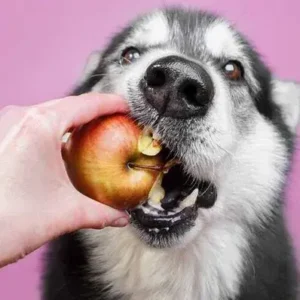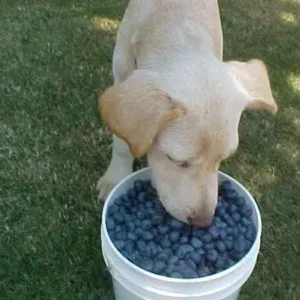How Many Peaches Can Dogs Eat?
When feeding peaches to your dog, moderation is key. Treats, including peaches, should make up no more than 10% of your dog’s daily diet, with the remaining 90% coming from a balanced dog food diet.
For safety, each peach piece should be cut into ½-inch cubes to prevent choking and aid digestion.
Below is a general guideline on how much peach you can feed your dog breed based on their size:
| Dog Size | Weight Range | Recommended Peach Pieces | Example Breeds |
| Extra-small | 2-20 lbs | 1-2 pieces | Yorkshire Terrier, Chihuahua, Pomeranian, Pug, Shih Tzu |
| Small | 21-30 lbs | 2-3 pieces | Basenji, Beagle, Miniature Australian Shepherd |
| Medium | 31-50 lbs | 4-5 pieces | Basset Hound, Border Collie, Australian Cattle Dog, Siberian Husky |
| Large | 51-90 lbs | 5-6 pieces | Pit Bull, German Shepherd, Labrador Retriever, Australian Shepherd |
| Extra-large | 91+ lbs | Handful of pieces | Newfoundland, Bernese Mountain Dog, Saint Bernard, Great Pyrenees |
Potential Risks of Feeding Peaches to Dogs
While peaches offer several health benefits, there are also some risks to be aware of before sharing this fruit with your pup. From toxic pits to high sugar content, here are some potential dangers to keep in mind.
Peach Pits Are Toxic to Dogs
One of the biggest concerns with peaches is their pit (or stones). The pit contains amygdalin, which breaks down into cyanide when consumed. This can be extremely dangerous and even fatal to dogs. Additionally, the pit poses a choking hazard and may cause an intestinal blockage if swallowed.
Tip: Always remove the pit before offering a peach to your dog.
High Sugar Content
While peaches contain natural sugars, too much can lead to weight gain, obesity, and diabetes, especially in dogs with pre-existing conditions. Moderation is key.
Pesticides & Preservatives
Non-organic peaches are often treated with pesticides, which can be harmful to dogs. Additionally, canned peaches and peach-flavored products contain added sugars, artificial sweeteners (like xylitol), and preservatives, which are toxic to dogs.
Tip: Always choose fresh, organic peaches and wash them thoroughly before feeding.
How to Safely Feed Peaches to Your Dog
To safely introduce peaches into your dog’s diet:
- Remove the pit and stem completely to prevent toxicity and choking.
- Cut the peach into small, bite-sized pieces for easy digestion.
- Feed in moderation – small amounts as an occasional treat.
- Monitor your dog for any signs of an allergic reaction or digestive upset.
Avoid canned peaches, peach-flavored products, and peach pits.
What to Do If Your Dog Eats a Peach Pit
If your dog accidentally swallows a peach pit, act quickly.
Watch for symptoms of cyanide poisoning, including:
- Drooling excessively
- Difficulty breathing
- Dilated pupils
- Weakness or collapse
Signs of intestinal blockage include:
- Vomiting
- Loss of appetite
- Lethargy
- Constipation or diarrhea
Immediate Action: Contact your veterinarian or an emergency pet clinic if you suspect your dog has ingested a peach pit.
Peaches in Different Ways: Fun Treats for Your Dog
Want to make peach treats more exciting for your pup? Try these creative ways to serve them:
- Fresh Peach Slices – Simple, bite-sized pieces make for a juicy and nutritious snack.
- Peach Food Topper – Mash or finely chop peaches and sprinkle them over your dog’s regular food.
- Frozen Peach Bites – Freeze small peach chunks for a refreshing summer treat.
- Peach Smoothie – Blend peaches with plain, unsweetened yogurt and a little water for a dog-friendly smoothie.
- Homemade Peach Dog Treats – Mix pureed peaches with oat flour and bake them into soft dog biscuits.
Dog-Friendly Alternatives to Peaches
If you’re looking for safe and delicious alternatives, consider these dog-friendly fruits:
- Apples (without seeds) – Crunchy and full of fiber
- Blueberries – Low in calories and packed with antioxidants
- Watermelon (seedless) – Hydrating and refreshing
- Bananas – Great for digestion in small amounts
- Strawberries – Full of vitamin C and fiber
These fruits offer similar health benefits without the risks associated with peach pits.





